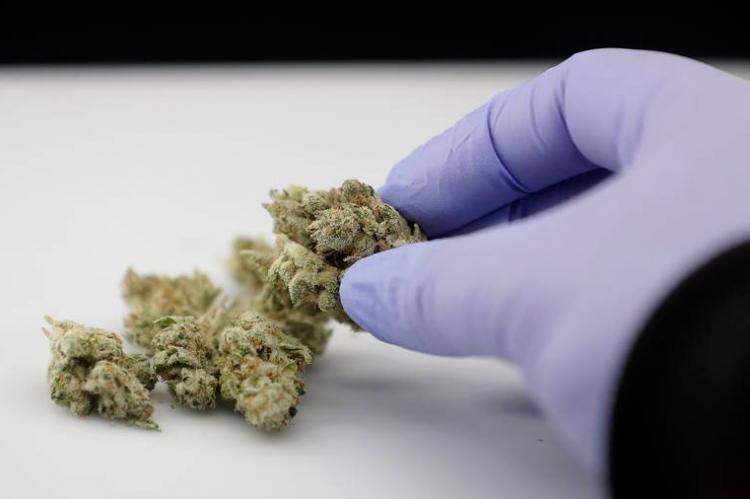THC cap on medical marijuana progresses in the House
An amendment that establishes a potency cap of 10% THC for medical marijuana patients under 21 has made its way back to the Florida House floor, where it was tacked onto a larger healthcare bill during a floor session Thursday.
The amendment, which passed with a voice vote on the floor, would not apply to patients 21 and younger with terminal illnesses.
THC is the main psychoactive compound in marijuana, and can be found in whole-flower marijuana, tinctures, oils, vaporizers and edibles. Smokable cannabis now being sold by the state’s medical marijuana treatment centers has potency as high as 30%.
The proposal to put a cap on THC levels in medical marijuana has become a bone of contention in Tallahassee over the last two years.
Capping THC is a priority of House Speaker José Oliva, R-Miami Lakes, who said Wednesday the chemical in medical marijuana could “possibly be detrimental to a young brain.”
Oliva made a business career building his family’s cigar brand, Oliva Cigars, which he launched with his brothers in 1995.
The more moderate Senate showed little interest in capping THC.
THC CAPS IN THE FL HOUSE
The House led the charge on capping THC last year, but the idea fizzled at the end of the legislative session. Last week the idea popped up in the Senate, but it was withdrawn after not garnering enough support.
The amendment eventually landed in the House, where it was tacked onto a large, sweeping healthcare package filed by Rep. Ana Maria Rodriguez, R-Miami. The amendment was never debated in committee, where the public has the opportunity to comment in front of lawmakers.
Rep. Ray Rodrigues, who pushed the issue in 2019, was behind the proposal again.
“The science on this settled ... the brain is not fully developed until it is 25. Those under 21 are most susceptible to the effects of marijuana,” the Estero Republican said. “That’s what the science is.”
Rodrigues’ amendment also clarifies daily dose limits on medical marijuana, mandates that independent testing labs cannot be owned by a medical marijuana treatment center and requires that the state cannot renew a medical marijuana treatment center’s license if the company is not dispensing marijuana, addressing what some call “ghost license holders.”
Last year, a similar healthcare bill of Rep. Ana Maria Rodriguez’s got “bogged down” after she was saddled with a THC cap amendment that eventually caused the bill to stall out
Her bill revises provisions related to a slew of healthcare issues, like children’s medical services, license requirements for certain medical professions and incident reporting for dentists. It has not yet gone for a full House vote.
“[THC caps] are obviously a contentious issue, but the overall bill has so much good in it, so I hope that it passes with or without the THC cap,” Rodriguez said. “I have personally not taken a position one way or another, but I’m open to hearing the debate.”
She said since the THC cap mandate is an Oliva priority, she thinks passing the cap may have success in the Senate in exchange for a priority of Senate President Bill Galvano, R-Bradenton.
“The likelihood is that it may be an issue that may be being used as a bargaining chip,” she said.
Some Republicans, like Sen. Jeff Brandes, R-St. Petersburg, have spoken out against the idea, warning that capping THC levels would make life worse for many veterans who use medical marijuana to cope with issues like like post-traumatic stress disorder.
DEMOCRATS PUSH BACK
House Democrats who opposed the amendment brought up issues of cost, interference with doctor-patient relationships and potential future litigation.
Rodrigues said he has researched countries that have THC caps, like the Netherlands, and used European studies to come up with the 10% number, as opposed to 15% or other proposed caps.
He cited research indicating that high-potency marijuana is associated with earlier onset of psychosis and the development of schizophrenia in marijuana users.
Once Swedish study he cited was based on patients who had experienced at least one psychotic episode in their lives and then self-reported their previous marijuana usage to researchers.
“If you look at governments that have done this ... the allegation that people will consume more does not prove to be the fact that occurred,” he said.
Rep. Carlos Guillermo Smith, D-Orlando, filed an amendment to strip out the THC cap and instead mandate a study examining whether any qualified patient has been harmed by the use of medical marijuana. His amendment failed 42-68. One Republican voted for the amendment — Rep. Sam Killebrew, R-Winter Haven.
“As you can tell, me and many other people do not believe it is appropriate for the legislature to enact these THC caps and place itself between a patient and a doctor,” he said. “I have heard from dozens of families, doctors, organizations and moms who are adamantly opposed to capping THC in this way.”
- Log in to post comments

